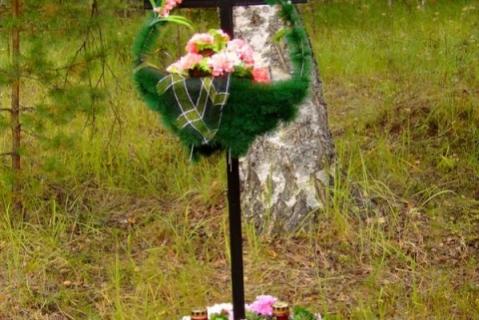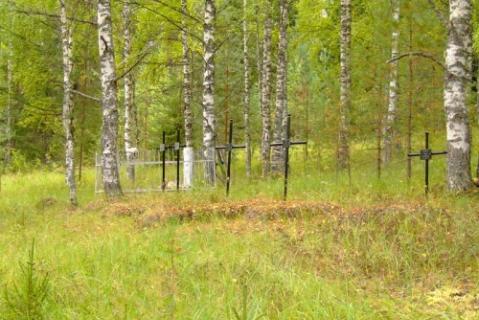The Vokvad special settlement in the Sysolsky (later Koigorodsky) district of the Komi Republic was created in 1930 by dekulakised peasant families, expelled from the Arkhangelsk and Vologda Regions and from the Volga. In February 1940, a group of deported Polish citizens (“military settlers”, about 20 people) were brought there, followed in June that year by a group of Polish Jews (“refugees”, about 300 people).
The forced settlers who died in Vokvad were buried in individual graves in a cemetery in the woods one km from the village. According to other sources, the cemetery was at first located 500 metres to the south of Vokvad; then the land was ploughed up and the new cemetery was located on the banks of the Vad lake. The settlement was closed in 1974.
In 2001, descendants of the inhabitants of the Vokvad special settlement erected a metal commemorative cross with a memorial plaque in the cemetery.
The Memorial online database (2025) lists 129,473 victims in the Komi Republic. (See Nizhny Chov.)
They include a vast number of families and individuals (total 64,165) deported to the Republic: 20,366 during collectivisation (1929-35), a massive influx in 1940 from occupied Polish territory (19,367) and more in the 1940s and 1950s (6,699). 597 are confirmed as dying in Komi (but cf. Tomsk Region police figures).
The database names families and individuals (total 1,308) deported to Vokvad and 213 who were born there. 920 were sent there in 1930, many of them German (281); it names 67 of them who died.
| Date | Nature of ceremonies | Organiser or responsible person | Participants | Frequency |
|---|---|---|---|---|
|
July
|
Commemorative visit (2-3 days)
|
Former Vokvad deportees
|
Descendants of those deported to Vokvad
|
Annual event
|
| State of burials | Area | Boundaries |
|---|---|---|
|
Burial mounds and subsidence, individual headboards
|
not established
|
not delineated
|
T. Chugayeva, “A candle floats on the water”, Respublika (Syktyvkar), 31 July 2010
Reingold Bikhert, “Grandma’s prayers have protected me all my life”, Respublika (Syktyvkar), 25 January 2013
“Memory has no statute of limitation”, Novaya zhizn, 8 September 2014 [retrieved on 28 December 2024]


